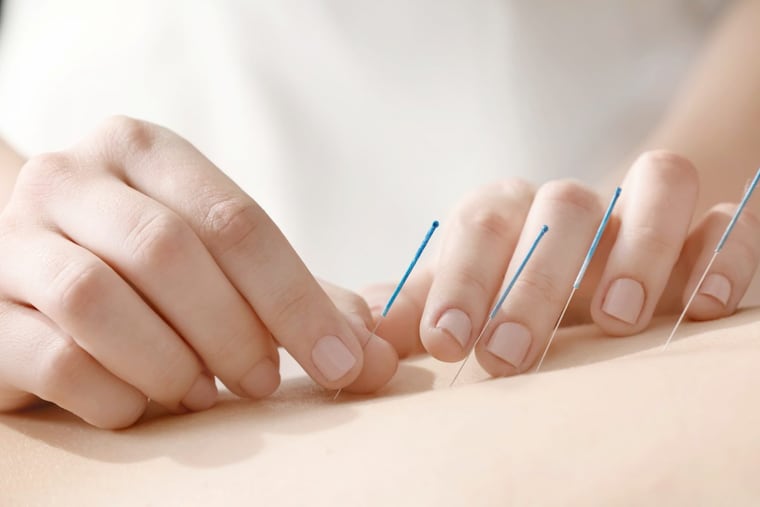Interested in acupuncture? Tips, recommendations to find the best Philly area practitioners
The nonprofit Delaware Valley Consumers’ Checkbook regularly surveys local patients on their experiences with healthcare providers, including acupuncturists. Inquirer readers can view their ratings of acupuncturists at Checkbook.org/Inquirer/Acupuncture — ratings available free of charge until June

Back pain. Headaches. Allergies. Arthritis. Anxiety. Morning sickness. Acupuncture practitioners claim their centuries-old school of alternative medicine can treat dozens of medical problems — with few side effects or risk of complications.
Some health-care providers see acupuncture as a possible tool to battle the U.S. opioid epidemic, which largely was brought about by legal prescriptions of painkillers. Recently, the American College of Physicians released a recommendation to use acupuncture as one of the first treatments for low-back pain. The “Pain Management Standards” from the Joint Commission — a nationwide nonprofit that accredits health-care organizations — now includes acupuncture as a non-pharmacological strategy for managing pain.
Western medicine proposes several theories on how acupuncture works. One premise: It releases the body’s own painkillers, or endorphins. Research finds that needle insertion prompts the flow of adenosine, a chemical that reduces inflammation. Another hypothesis, the Gate Control Theory of Pain, argues that the body shuts down pain receptors in response to acupuncture’s needling.
In Eastern medical lingo, ailments are described in terms of an excess of or deficiency in yin or yang, forces that are connected and interdependent. Energy, or qi (pronounced “chee” in Chinese), flows through the meridians or pathways of the body. These pathways connect via acupuncture points that relate to internal organs; acupuncture’s specialized needle placements restore the balance of yin and yang by reducing disruptions along the meridians, improving the flow of qi and promoting healing.
Although there’s much evidence that acupuncture often alleviates pain and successfully treats a range of symptoms and diseases, there’s no clear answer as to acupuncture’s true value. Clinical studies aimed at measuring its effectiveness are limited. Many skeptics argue that any benefits of getting stuck probably derive from a placebo effect.
That’s because it’s difficult to test the efficacy of acupuncture. In double-blind studies, the gold standard for testing effectiveness of drugs or treatments, neither participants nor experimenters know which group is getting which treatment. Typically, one group receives the conventional drug or treatment while another group receives a placebo. The problem is, there are no good placebo substitutes for acupuncture — even when testers use sham needles, patients typically know they aren’t really being poked.
Another problem in assessing acupuncture (and other treatments) is that ailments often simply resolve themselves. Back pain, Bell’s palsy, or insomnia may go away during a course of acupuncture treatment, but these problems might also have healed or disappeared on their own.
But because it works and, when properly performed, involves very few risks, and virtually no negative side effects, maybe you shouldn’t overthink it.
After all, thousands of drugs and procedures are prescribed to treat conditions at enormous cost every day, often without a precise understanding of why they work, or whether they are effective compared with other approaches or doing nothing. Unlike acupuncture, these approved treatments often pose serious risks to patients.
And it’s clear that patients who try acupuncture love it. A recent study by American Specialty Health Inc. surveyed 89,000 patients who received treatment for chronic pain. It found a vast majority (87 percent) of patients rated their acupuncturists favorably (9 or 10 on a 0-to-10 scale), somewhat more favorably than patients rated conventional health-care providers (76 percent to 80 percent). Nearly all (99 percent) of the surveyed acupuncture patients rated their providers good or excellent, and almost none reported minor or serious adverse effects.
If you’re looking for an acupuncturist, talk with your friends and physician for recommendations. The nonprofit Delaware Valley Consumers’ Checkbook regularly surveys local patients on their experiences with health-care providers, including acupuncturists. Checkbook is offering free access to its ratings of acupuncturists to Inquirer readers through this link: Checkbook.org/Inquirer/Acupuncture. Ratings are available free of charge until June 8.
If the acupuncturist is a physician, look for certification by the American Board of Medical Acupuncture (www.dabma.org). Alternatively, consider a physician who is a member of the American Academy of Medical Acupuncture (www.medicalacupuncture.org).
If the acupuncturist is not a physician, check for certification by the National Certification Commission for Acupuncture and Oriental Medicine (www.nccaom.org). NCCAOM-certified acupuncturists can add “Dipl. Ac.” after their names.
Here are some questions to ask:
How long has the acupuncturist been in practice?
What training, licensing, and certifications does the acupuncturist have?
Does the acupuncturist have experience treating your type of condition or problem?
What techniques does the acupuncturist use? Some acupuncturists use a wide range of complementary techniques such as tu nai massage, moxibustion, and cupping; Others use just one approach.
Is the treatment covered by your health insurance plan? Do you need a referral from your physician?
As there are many qualified acupuncturists, and other consumers tend to be satisfied with them, pay attention to prices. Checkbook’s undercover shoppers called a sample of area acupuncturists for private treatment of arthritic knee pain and were quoted prices ranging from $60 to $260 for an initial session.
Checkbook’s shoppers also asked about prices for community acupuncture, which is a growing trend — acupuncturists treating multiple patients in the same room. Prices quoted to its undercover shoppers for community acupuncture were far lower than those for private sessions, ranging from $15 to about $60 per session.
_______________________
Delaware Valley Consumers’ Checkbook magazine and Checkbook.org is a nonprofit organization with a mission to help consumers get the best service and lowest prices. It is supported by consumers and takes no money from the service providers it evaluates.